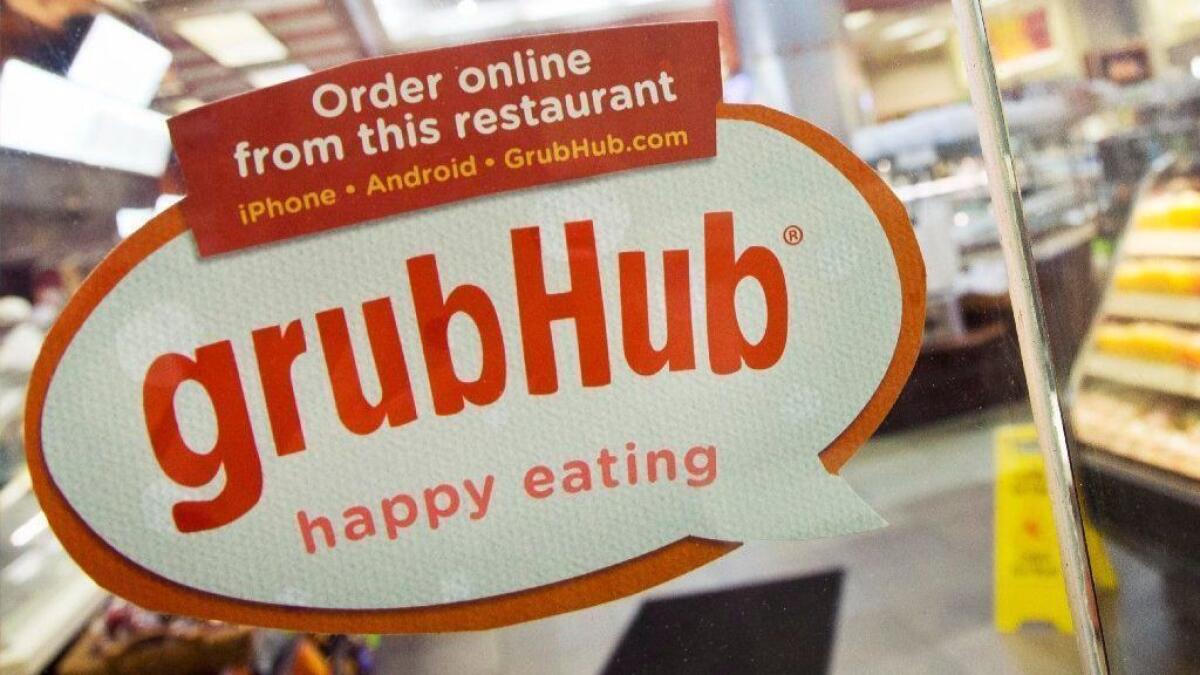Facing fury over ‘fake websites,’ Grubhub says restaurants have it wrong

It looked like yet another example of Big Tech’s overreach, a David-and-Goliath story pitting a massive internet platform against powerless individuals.
These were the facts: Grubhub, the food delivery firm, was buying up web domains named after mom-and-pop restaurants and using them to drive its own business.
But it wasn’t quite so cut and dried.
The outcry began Friday when the New Food Economy reported Grubhub had registered more than 23,000 domains in restaurants’ names without their consent in what the New Food Economy cast as an attempt to generate greater commission revenue and prevent restaurants from building their own online presences.
After enduring four days of outrage from restaurant owners and critics, Grubhub went on the offensive on Tuesday. In an email obtained by The Times, Chief Executive Matt Maloney said the allegations were “outright false,” insisting that restaurants using its food delivery platform had explicitly agreed to web domain purchases and the creation of websites advertising their businesses.
“We do not set up websites without the permission of a restaurant,” Maloney wrote in the email to employees. “We had a very clear provision in every one of our restaurant contracts saying we would provide this service to bring them more orders.”
Maloney also said Grubhub, which discontinued the practice of automatically creating websites for restaurants in 2018, charged restaurants substantially less for orders received via those websites than for those placed directly within its app, and turned ownership of the websites over to the restaurants upon their request.
“The allegations are untrue,” he wrote. “And those spreading false narratives are being reckless.”
Contract language obtained by The Times appears to support some of Maloney’s contentions. The second item in terms of service signed by restaurant owners states that Grubhub “may create, maintain and operate a microsite (“MS”) and obtain the URL for such MS on restaurant’s behalf.”
If Grubhub’s actions were interpreted as a sinister power grab, it may be a result of broader concerns by small businesses that find themselves increasingly at the mercy of huge internet platforms with the power to commandeer their customer relationships and skim their profits.
Over the last year, Grubhub has faced a slew of accusations of exploitative business practices, including posting fake phone numbers on its site, charging restaurants thousands of dollars in commission for calls unrelated to food orders and raising commissions to unsustainable levels, sometimes as high as 30%.
Yelp, another technology platform key to many small restaurants’ business, faced similar criticism after allegations emerged last year that it hid positive reviews for shops that refused to pay for advertising.
These issues have become endemic across the digital economy, according to Stacy Mitchell, co-director of the Institute for Local Self-Reliance. She said that the power imbalance between large tech platforms and the small businesses that use them means contracts are rarely set on equal terms.
“The terms of service have become a way for these large companies to establish and justify an exploitative relationship,” Mitchell said. “They’re typically something that is take it or leave it. If you don’t take it, you’re locked out of half the market.”
Grubhub told The Times that the line in its terms of service authorizing the creation of the microsites was on an opt-out basis, meaning restaurants could choose to reject or negotiate the provision. Despite this, Mitchell said it’s unlikely that restaurants were aware they had the ability to negotiate terms with a platform like Grubhub. “If you even read these conditions, your assumption is going to be that this is a take it or leave it deal,” she said.
Sharokina Shams of the California Restaurant Assn. said even if permission to create the microsites was given in Grubhub’s terms of service, the lack of communication and clarity on activity the company was undertaking on restaurants’ behalf is a problem.
“It seems like every time we hear from restaurateurs about their experience with third-party delivery services, words like ‘rip-off’ and ‘gouging’ come up,” Shams said.
Shams said restaurant owners often tell her organization that they lose money on orders through Grubhub and similar services but feel pressure to participate out of fear of losing new customers to competition.
“Now, to add insult to injury, we learn of these alleged ‘ghost’ websites and of charges to restaurants for orders that were never even placed. That’s unacceptable, and it’s something we’ll certainly be looking into further,” Shams said.
Oriett Mani, owner of Los Angeles cafe Citrus on Sunset, said she was unaware of the microsite that Grubhub had created in her restaurant’s name.
“This isn’t even my food,” said Mani, in reference to a large image of pancakes and bacon at the top of the microsite. “This location isn’t right either. I canceled this location with them months ago.”
Mani said she generally didn’t have any issues in her relationship with Grubhub but was trying to transition away from the platform because of the high commission fees.
“I’m trying to get all of the orders to go through me now,” Mani said. “They are giving me some business, but all that commission really adds up.”
More to Read
Inside the business of entertainment
The Wide Shot brings you news, analysis and insights on everything from streaming wars to production — and what it all means for the future.
You may occasionally receive promotional content from the Los Angeles Times.











